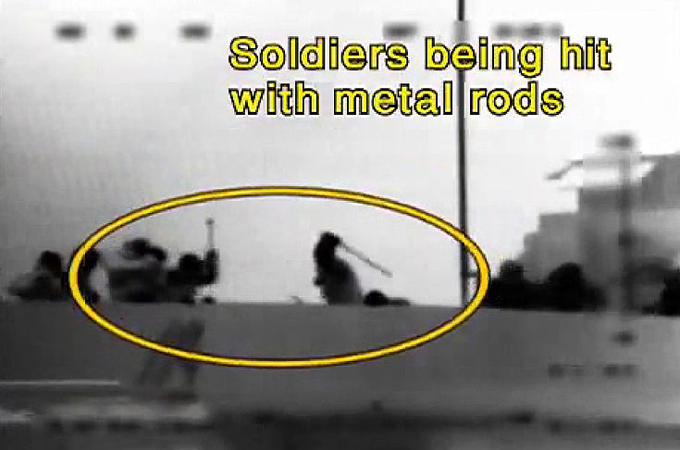Livni: Flotilla was provocation
Ex-Israeli foreign minister tells probe panel that Turkey engineered Gaza-bound convoy to “fill political vacuum”.

 |
| Israel claims activists on Mavi Marmara attacked navy commandos before the soldiers opened fire [AFP] |
Tzipi Livni, the former Israeli foreign minister and current opposition leader, has described as a “provocation” the attempt by a Turkish humanitarian group to break the Israeli blockade of Gaza by sending an aid flotilla last May.
Testifying on Monday before the Turkel Commission investigating Israel’s deadly raid on the flotilla on May 31, Livni said that Turkey “engineered” the convoy as part of an effort to “fill a political vacuum” left by the stagnation in Israeli-Palestinian peace talks.
Though she said she disagreed with some of the embargos placed on Gaza Strip as part of Israel’s ongoing blockade, Livni’s “passionate testimony” before the Israeli panel defended rather than questioned its legality, Al Jazeera’s Sherine Tadros reporting from Jerusalem, said.
| IN DEPTH |
 |
“In the absence of a peace process, with Israel’s policies toward the Palestinians unclear, Turkey was able to fill a political vacuum by engineering provocations,” Livni said, according to the Israeli newspaper Haaretz.
“She basically was saying that the international community never questioned the legality of this blockade. The disagreement … was more about specificities: Should certain items be let in or not, how many trucks are being let in or not,” Tadros said.
The back-and-forth between Livni and the committee seemed to indicate that the panelists were more concerned about how Israel’s actions appeared in the world’s eyes instead of whether they were legal or correct. The commissioners asked Livni to explain why the government had not done a better job explaining Israel’s actions to the world, Tadros said.
Israeli commandos seized the flotilla, after storming the lead ship Mavi Marmara, 60km off the Gaza coast.
Nine activists, including eight Turks, were killed, sparking a global outrage and severely damaged Israel’s ties with Turkey.
Passengers testify
The Turkel Commission also heard spirited testimony from two Arab citizens of Israel who were on board the Mavi Marmara. It was the first time the commission had heard from passengers.
One of them, Mohamed Zeidan, found himself arguing with a member of the committee, Al Jazeera’s Tadros said.
Zeidan’s testimony started “politely enough,” our correspondent said, but around one hour after it began a member of the committee halted him and asked him why he was referring to Israel’s blockade of Gaza as a siege, when “surely you should be using the word ‘closure'”.
The comment by the judge “underlined … [that] the Turkel Commission have pretty much come to their conclusion already, in terms of whether or not there was a humanitarian crisis or not in Gaza,” Tadros said. That conclusion is important because it means that the commission will not view the aid flotilla’s attempt to break the blockade as justified, she said.
Lieutenant-General Gabi Ashkenazi, the chief of staff of the Israeli military, told the commission on Sunday that his troops fired 308 bullets during the storming of the Mavi Marmara, but an aide to Ashkenazi told the Reuters news agency that only 70 rounds had been fired with an intent to hit the activists, while the other 238 were fired as warning shots.
Ashkenazi and other Israeli officials have said that the commandos opened fire only after activists on board the ship attacked them with clubs and slingshots. They say the activists rushed the commandos and stole pistols and an Uzi submachine gun. One commando suffered a gunshot wound. The activists claim the commandos fired first and that, while they did steal guns away from the soldiers, they threw them overboard without using them.
The Turkel Commission has called on other passengers to testify, but it remains unclear if any will. The two Arab-Israeli men who appeared on Monday came only after they were warned by the commission that they were legally obligated to do so.
Zeidan and the other man, Sheikh Hamad Abu Daabis, had previously refused to appear. Zeidan said he had sent the committee a letter explaining his views.
“I clarified that I do not want to co-operate with this committee because it was appointed by the government, which is a party [to the dispute] … I view it as empty of meaning and its recommendations as unacceptable,” Zeidan told the AFP news agency.
The commission was formed by the Israeli government in response to the raid and is chaired by a former Supreme Court judge. It is separate from an ongoing United Nations probe into the Mavi Marmara raid.